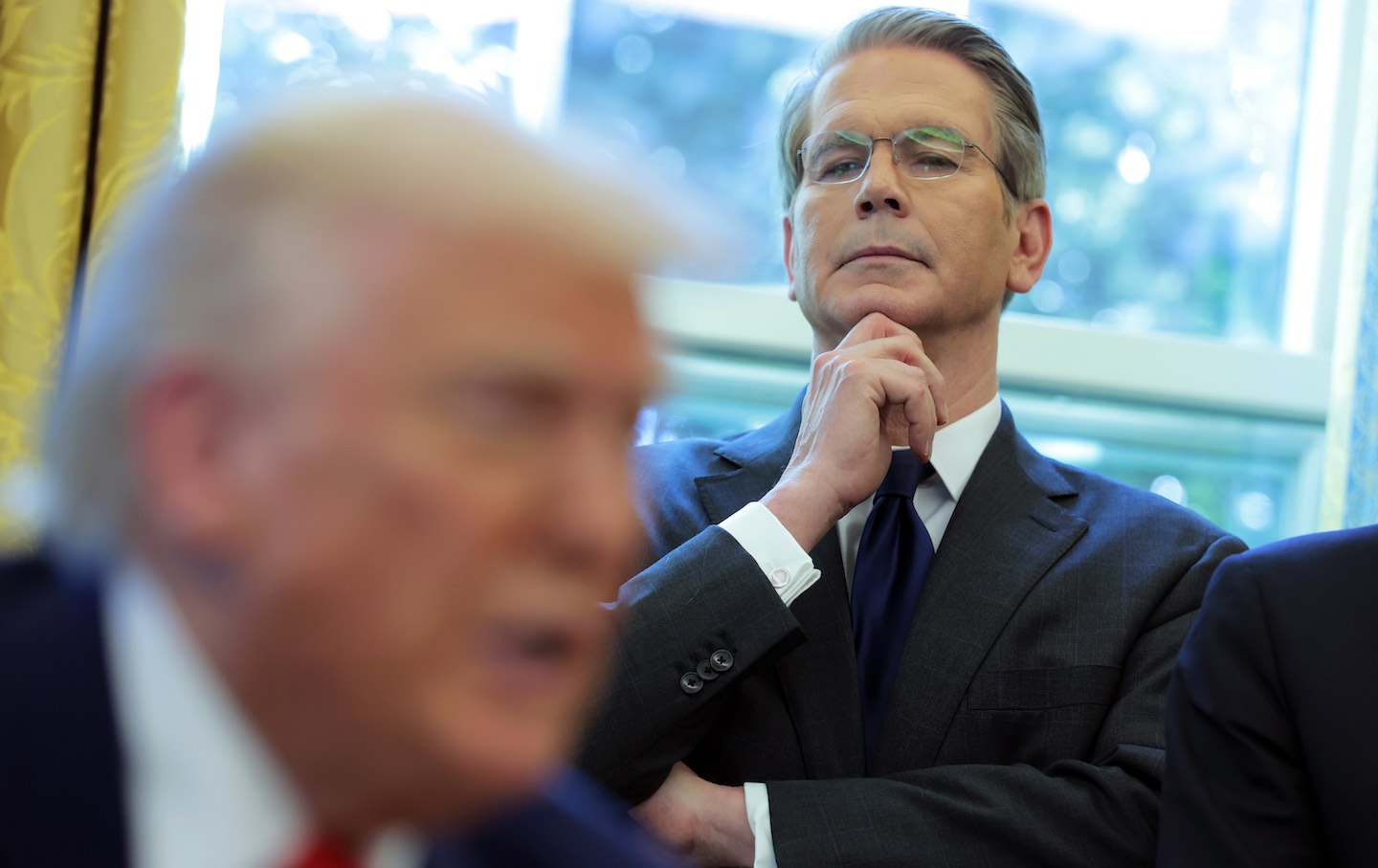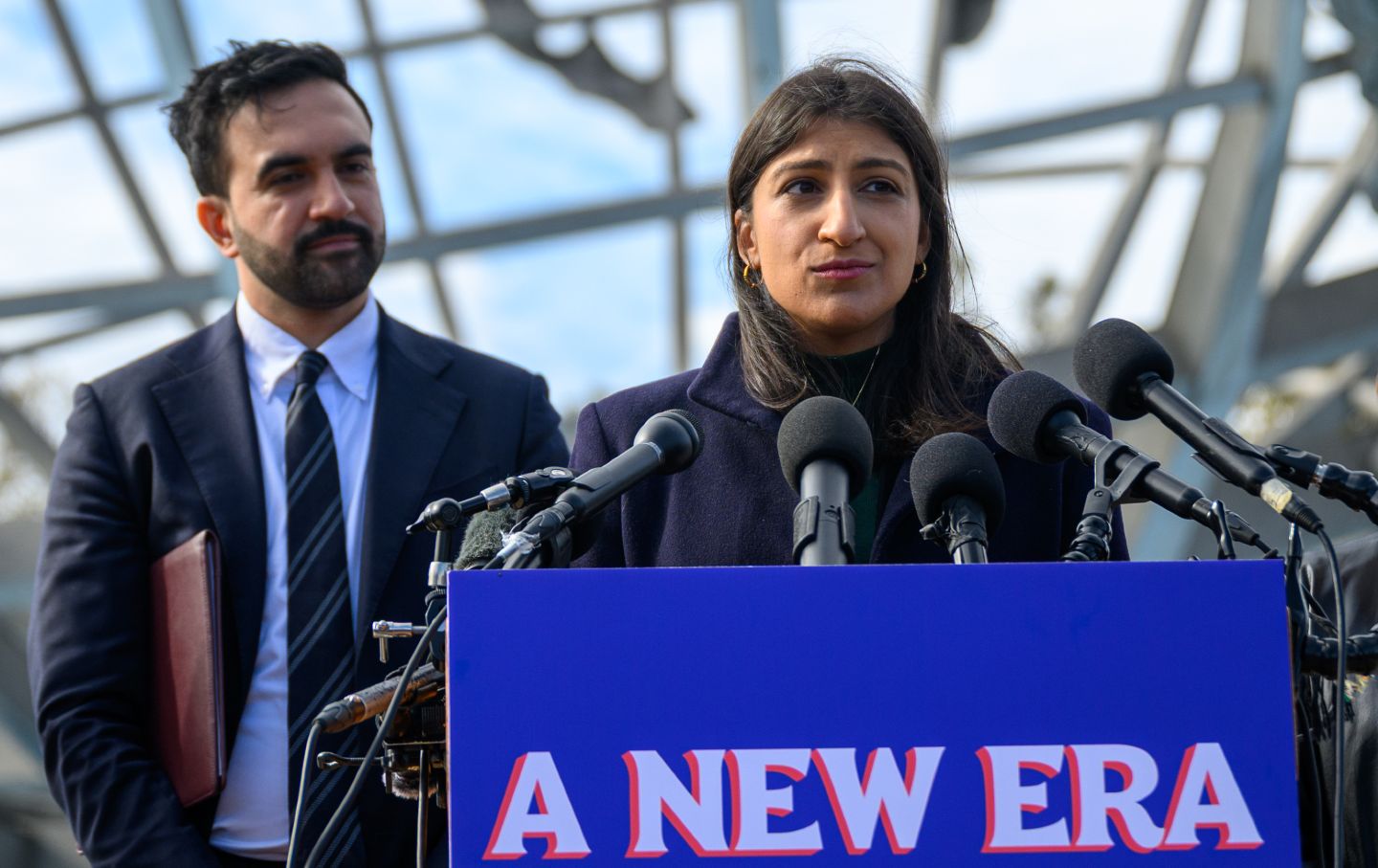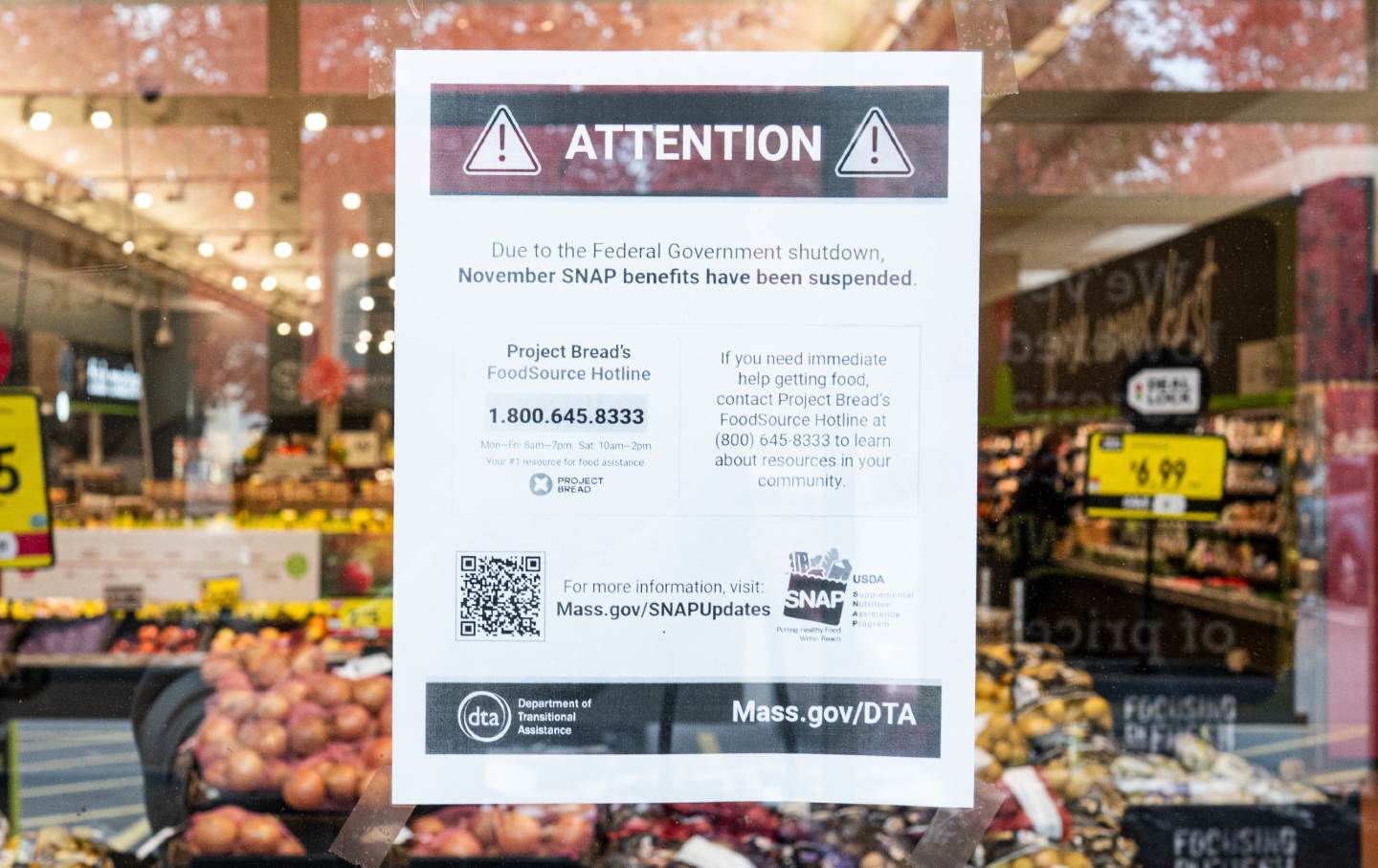Trump’s Economic Advisers Are Suddenly Trying to Act Normal
After global panic over the president’s trade proposals, Treasury Secretary Scott Bessent is downplaying his boss’s bluster.

Treasury Secretary Scott Bessent looks on as President Donald Trump signs executive orders in the Oval Office on April 9, 2025.
(Anna Moneymaker / Getty Images)After weeks of world-historical drift and chaos, the Trump economic team has a new de facto motto: The reassurances will continue until the investors are distracted.
For now, a coordinated effort to de-escalate brewing global trade wars has settled the mood on Wall Street, which, after being on track to clock its worst April since the Great Depression, has staggered into 2,000-point mini-rallies in response to indications from Trump and Treasury Secretary Scott Bessent that there won’t be a protracted trade war with China. In a putatively private meeting with bankers, Bessent pronounced the present tariffs on both sides—145 percent for the United States, and 125 percent from China—“unsustainable.” And Trump declared that he won’t pursue aggressive tariff retaliation against China, adding that the resulting tariffs on Chinese exports will “come down substantially, but won’t be zero.” (White House sources have since indicated that this vague target translates from Trumpese to somewhere in the range of 50 to 65 percent.) For good measure, Trump has also walked back his threat to fire Fed Chairman Jerome Powell—another illegal act that would send investors into conniptions—to further buoy the flagging animal spirits on Wall Street.
Yet the 48-hour stretch of flirtation with normalcy has the distinct feel of an abusive spouse pledging to reform. The bigger picture remains far from certain, with no clear American target or policy objective in view. Indeed, after Trump eagerly touted a US visit from a Japanese trade delegation as an early vindication of his new trade approach, the talks went nowhere, for the simple reason that the Japanese representatives couldn’t determine just what their American counterparts were asking for. As former US ambassador to Japan Charles Freeman recounted in a YouTube dissection of the visit, “Their experience apparently was they went to talk to the American leadership on this matter, and the American leadership said, ‘What are you offering?’ And the Japanese said, ‘Well, what is it that you want?’ And the Americans could not explain what they wanted. This is a cockamamie approach to negotiation.”
This remains the grim reality beneath the surface morale-boosting campaign orchestrated by Bessent, Trump, and the aspiring market-whisperers in the Trump White House. Without a clear point to the global trade panic touched off on “Liberation Day,” the safe harbor that investors are gamely trying to divine in these market-calming incantations could turn into a mirage at any moment. It’s telling that the designated oracle delivering the new gospel of reassurance appears to be Bessent, who is the closest thing the Trump economic team has to a traditional Republican policy hand; Trump’s unhinged trade consigliere, Pete Navarro, and his only marginally less unhinged commerce secretary, Howard Lutnick, seem to be quarantined far from the range of a news camera this week.
Bessent is doing his best to milk this opportunity. In a speech before a group of global banking and finance officials at the World Bank, he reiterated that the United States is acting as a reputable keeper of trade relations, and remains committed to maintaining a “strong dollar” backstop to global markets. Bessent went on to fantasize that a Trump-led economic order would create a “blueprint to restore equilibrium for the global financial system” and outlined recommendations for the International Monetary Fund and the World Bank to fall in line. “America First does not mean America alone,” Bessent said. “On the contrary, it is a call for deeper collaboration and mutual respect among trade partners.” (The question of why this anodyne prescription should be packaged under the old isolationist refrain of “America First” apparently wasn’t up for discussion.) The order of the day, he continued, is to “rebalance” a trade regime that’s been working for too long against American interests, hobbling domestic manufacturing and stunting American access to export markets. “We will not abide the IMF failing to critique the countries that need it—principally surplus markets,” Bessent announced in a wonkish reformulation of Trump’s claim that other countries are “ripping us off.”
Bessent also brandished his MAGA bona fides by venturing into a Mad Libs culture-war castigation of IMF “mission creep”: “Now it devotes disproportionate time and resources to work on climate change, gender, and social issues,” he nonsensically asserted, perhaps envisioning a payoff to come at the behest of yet another sloganeering executive order. In another swipe at China, Bessent also decried the World Bank’s failure to suspend financing developing-economy loans to countries that had, in reality, graduated into fully developed trade surpluses. “Treating China— the second-largest country in the world—as a developing country is absurd,” he said. “If China wants to play a role in the global economy” that’s consistent with its actual stature, “the country needs to grow up.”
Aside from the policy particulars here, the failures of the Chinese Communist Party to address baseline economic needs domestically, combined with the Chinese economy’s protracted slowdown, which jeopardizes growth across Asia, makes World Bank support far from absurd on the face of things; it’s hardly a savvy negotiating tactic to liken one of your most consequential trading partners to a willful child. (Bessent compounded this slur in his Q and A remarks saying that China reminded him of his own teenage son, “who sometimes wants to be treated like a child, and sometimes wants to be treated like an adult.”)
It’s also the awkward truth that the sulky, petulant, and maturity-challenged lummox in the room is the United States. Indeed, a week ahead of this week’s DC meetings, the IMF issued a warning that tensions over global trade partnerships could trigger a global economic crisis, while the UN Trade and Development agency sees global growth now verging on a recession thanks to the same forces. In other words: Abusive dads, heal thyselves.
Disobey authoritarians, support The Nation
Over the past year you’ve read Nation writers like Elie Mystal, Kaveh Akbar, John Nichols, Joan Walsh, Bryce Covert, Dave Zirin, Jeet Heer, Michael T. Klare, Katha Pollitt, Amy Littlefield, Gregg Gonsalves, and Sasha Abramsky take on the Trump family’s corruption, set the record straight about Robert F. Kennedy Jr.’s catastrophic Make America Healthy Again movement, survey the fallout and human cost of the DOGE wrecking ball, anticipate the Supreme Court’s dangerous antidemocratic rulings, and amplify successful tactics of resistance on the streets and in Congress.
We publish these stories because when members of our communities are being abducted, household debt is climbing, and AI data centers are causing water and electricity shortages, we have a duty as journalists to do all we can to inform the public.
In 2026, our aim is to do more than ever before—but we need your support to make that happen.
Through December 31, a generous donor will match all donations up to $75,000. That means that your contribution will be doubled, dollar for dollar. If we hit the full match, we’ll be starting 2026 with $150,000 to invest in the stories that impact real people’s lives—the kinds of stories that billionaire-owned, corporate-backed outlets aren’t covering.
With your support, our team will publish major stories that the president and his allies won’t want you to read. We’ll cover the emerging military-tech industrial complex and matters of war, peace, and surveillance, as well as the affordability crisis, hunger, housing, healthcare, the environment, attacks on reproductive rights, and much more. At the same time, we’ll imagine alternatives to Trumpian rule and uplift efforts to create a better world, here and now.
While your gift has twice the impact, I’m asking you to support The Nation with a donation today. You’ll empower the journalists, editors, and fact-checkers best equipped to hold this authoritarian administration to account.
I hope you won’t miss this moment—donate to The Nation today.
Onward,
Katrina vanden Heuvel
Editor and publisher, The Nation








